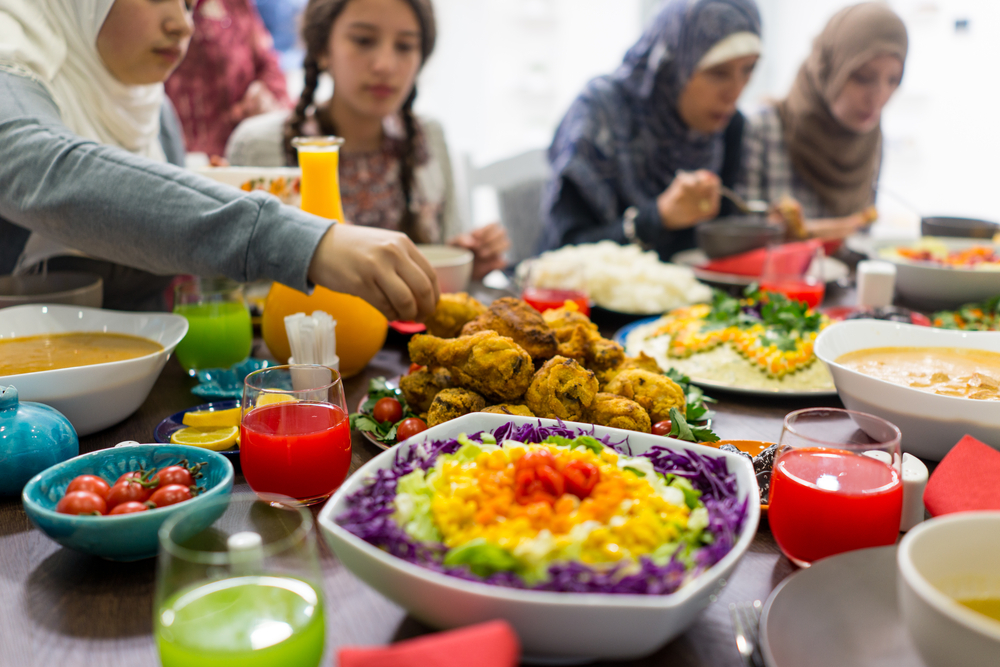The Holy month of Ramadan is here with us again. With the long hours of fasting and a wide variety of mouthwatering meals to choose from for Iftar and Suhoor, healthy eating can be quite a challenge. However, this need not always be the case. It is possible to maintain healthy eating habits throughout this period.
Since normal dietary pattern is altered during Ramadan to accommodate only two meals per day, it is important to ensure these meals are healthy, well balanced with foods from all food groups.
Taking care of your diet during Ramadan is very important. It helps people stay energetic and productive throughout the period, and also helps finish Ramadan without any hiccup.
The following tips can help keep you and your family healthy and happy through the holy month of Ramadan:
If you can, don’t skip Suhoor.
Suhoor provides you with the energy to last you through the fast, and helps you avoid overindulging during Iftar. Ensure that it is well balanced by including a vegetable, whole grain carbohydrate like whole grain bread and a protein rich food like an egg. Suhoor is important especially to special groups such as the elderly, adolescents and children who chose to fast.
‘Eat Suhoor, for in Suhoor there is blessing,” As narrated in the hadith by Bukhari and Muslim.
Break the fast with some dates.
Breaking fast with dates is a traditional and healthy way to begin Iftar. Dates are a good source of energy, vitamins, minerals and fiber. They are easily digestible making them a quick source of energy and nutrients. They help satisfy the hunger sensation when breaking fast, which helps one not to overeat. Dates are also rich in potassium and magnesium which aids in restoring the body’s electrolyte balance after the fast. Having about three medium sized dates with water is a good way to break the fast.
Drink fluids before eating
Dehydration is not uncommon during Ramadan. If you go straight to solid food when you break your fast, you will fill up your stomach before you get a chance to rehydrate. Water and fresh clear soups provide the body with essential fluids, reduces risk of dehydration and prepares the body for the main meals.
How to keep your body hydrated:
- Drink plenty of water or fresh clear soups between Iftar and Suhoor
- Add water melon to your Suhoor or have it as a sweet treat after Iftar
- Eat more of green salad as they are hydrating and are loaded with vitamins, minerals and fiber which keeps off constipation
- Avoid caffeinated drinks and fizzy as they are more dehydrating.
Moderate your intake
Go slow on the amount of food you consume at Iftar. During Ramadan, the window of eating is very small hence you may be tempted to eat large meals to compensate for the time you stay without food. Instead of having one large meal, take smaller meals between the time you break the fast and the time you go to bed. Ensure your meal has plenty of vegetables, a carbohydrate and a protein.
Focus on complex carbohydrates
Complex carbohydrates are rich in fiber, vitamins and mineral. They are digested slowly, are more filling and provide a lower steadier release of glucose into the blood stream. Refined carbohydrates are digested much faster and cause a fast release of glucose which can leave you feeling fatigued and cause the feeling of hunger much faster.
Use healthier cooking methods
Deep fried foods and pastries often high in sugar, refined carbohydrates and salt are a common delicacy during Ramadan. If consumed excessively, they can leave one feeling fatigued, bloated and with a few extra kilos which may be hard to shed afterwards which increases your risk of non-communicable diseases. Use healthier methods like steaming, stir frying, baking or other methods that use small amount of oil.
Cut down on sugar
Sweet desserts are a common delicacy during Ramadan. However, sweets and sugary desserts are high in calories with no other nutritional benefit. Such foods and drinks will leave you feeling drained and craving for more sugar. If you want a sweet dessert, go for a fruit salad instead.
Prepare your Suhoor before bed
Due to the small eating and sleeping window during Ramadan, it is better to prepare Suhoor before going to bed. This ensures that you don’t skip the only meal that fuels your body for the next 12 hours.
Stay active
It is easy to adopt a sedentary lifestyle during the period of Ramadan which can easily lead to excess weight gain. Shedding excess weight is not an easy task and can be draining both physically and mentally. Of most importance, excess weight gain increases your risk of conditions like diabetes, hypertension and heart diseases. Include moderate physical activity like brisk walks, swimming or cycling to keep your body active.
Take time to eat your food
It is tempting to gobble your meals after a fast. This is a bad idea as it often leads to overeating. Slow eating allows time for the hormones that signal fullness to arrive from the stomach to the brain which helps you to stop eating before you are stuffed. If you eat too fast, you overeat before the signal reaches your brain.
Fasting with diabetes and hypertension
People with type 1 diabetes are generally advised not to fast as they can easily get into hypoglycemia. Those with type 2 diabetes and hypertension and have their conditions under control through medication and diet, may be able to fast. However, they should do so under guidance from their doctor and nutritionist/dietician for individualized advise.
Over-indulging on Iftar and Suhoor meals is not uncommon and can lead to weight gain and increase your risk of non-communicable diseases. Ramadan is a time to practice self-control, self-discipline, sacrifice and empathy to others. It is good to maintain these practices even outside your fasting hours as you have your meals.
Many studies suggest that fasting has great effect on health. Maintain the healthy habits picked during this holy month for a healthy lifestyle and prevention of non-communicable diseases like obesity, diabetes, hypertension and cardiovascular diseases.
Example of an Iftar meal
- 3 dates and water or a home-made vegetable soup (not from soup powder)
- A green/ vegetable salad (for example lettuce, cucumber, tomatoes and apple)
- Chicken/fish/lean lamb with vegetable rice or whole grain chapatti
Example of a Suhoor meal
- 2 slices of whole grain bread
- 2 egg-vegetable-omelet or two boiled eggs
- Some vegetable cuts (tomatoes and cucumbers)
- A cup of tea/chocolate or milo
RAMADHAN KAREEM رمضان كريم





